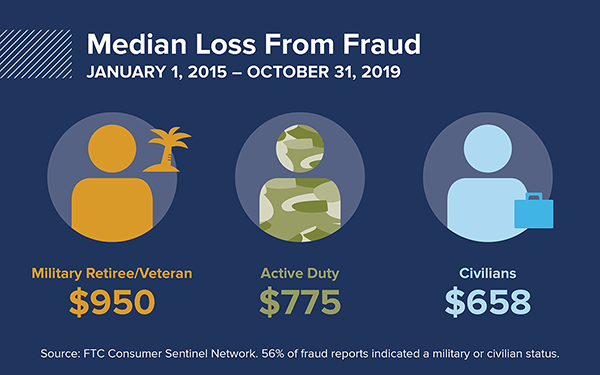 When people report scams to the FTC, we learn a lot about how they experience fraud. These fraud reports are important for law enforcement and education efforts. And, as more and more people report fraud, the data can tell a more detailed story about specific groups of people. One example is recent data showing some differences between military consumers – both veterans and active duty – and civilians.
When people report scams to the FTC, we learn a lot about how they experience fraud. These fraud reports are important for law enforcement and education efforts. And, as more and more people report fraud, the data can tell a more detailed story about specific groups of people. One example is recent data showing some differences between military consumers – both veterans and active duty – and civilians.
Since 2015, the FTC has gotten 163,000 fraud reports from military retirees and veterans; nearly 13,000 from active duty servicemembers; and three million from civilians. Of these fraud reports, 12% of retirees and veterans reported a financial loss from the fraud – lower than the 16% of active duty servicemembers reporting a loss and the 14% of civilians who reported a loss.
But here’s the thing: the median loss for military retirees and veterans is $950. Compare that to the median loss for active duty servicemembers ($775) and for civilians ($658).
The median loss for veterans is 23% higher than current servicemembers – and 44% higher than that for other civilians. It’s worth noting and watching – and hearing from more servicemembers and veterans. The more people report frauds, the more we can flesh out the story and help law enforcement go after scammers and dishonest practices.
If you’re an active or retired servicemember, we want to hear about your experiences. If you spot a scam, tell the FTC. When you do, you’ll also be telling more than 2,300 law enforcers who are members of the Consumer Sentinel Network.




